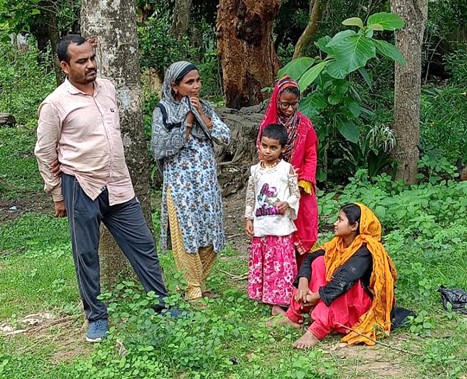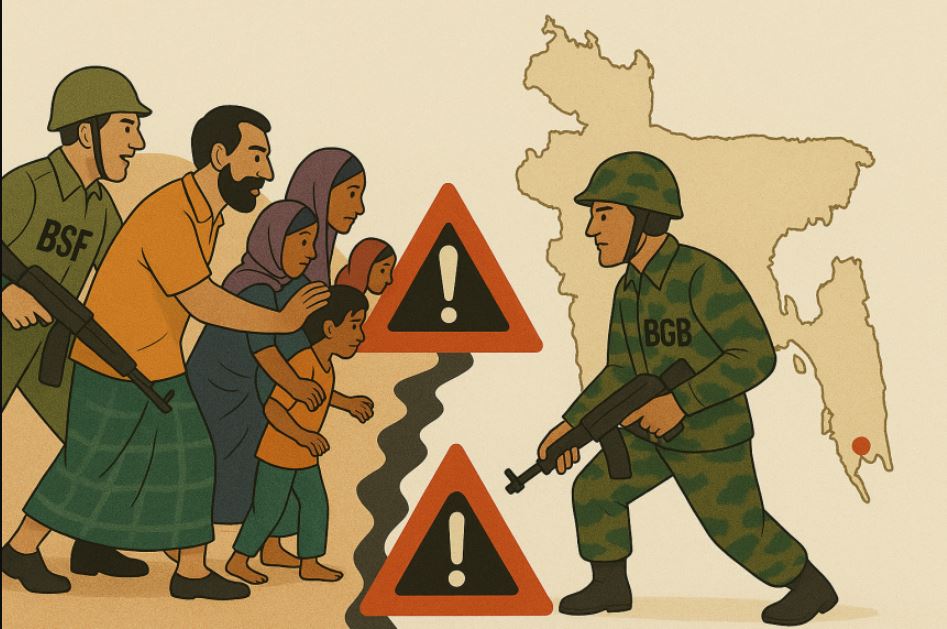India’s continued pushback of undocumented individuals into Bangladesh has reportedly reached an unprecedented level, triggering what officials and analysts describe as a deepening humanitarian and diplomatic crisis between the two neighbours.
According to Border Guard Bangladesh (BGB), nearly 2,000 individuals have been pushed into Bangladeshi territory through at least 22 different border points in the past two months alone—a scale never witnessed before.
Despite repeated diplomatic protests from Dhaka, Indian authorities have remained silent. Bangladesh’s foreign ministry issued a formal letter of protest earlier this year, but Delhi has yet to respond.
Meanwhile, reports of fatal shootings of Bangladeshi nationals by India’s Border Security Force (BSF) continue to surface.
Security analysts warn that India’s actions violate not only international law and human rights norms but also bilateral agreements such as the 1974 Land Boundary Agreement and the 2011 Coordinated Border Management Plan (CBMP), both of which mandate joint verification and formal repatriation procedures.
Speaking to TIMES of Bangladesh, Maj Gen (retd) Dr Md Sarwar Hossain said India’s approach represents “a clear violation” of both humanitarian principles and binding treaties.
“Bangladesh must respond with measured firmness,” he said. “Diplomacy should lead the way—through high-level dialogue, coordinated border mechanisms, and potentially a UN-supervised joint verification commission to resolve identity disputes and halt unilateral returns.”
“This is not just a border issue,” he added. “It is a critical test of Bangladesh’s sovereignty and regional diplomacy. Any response must uphold international law and human dignity.”
BGB chief Major General Mohammad Ashrafuzzaman Siddiqui told reporters in Chattogram that “pushbacks will not be tolerated and will be resisted.” He said the paramilitary force has formally communicated its objections to both BSF and the relevant ministries in Dhaka.
National Security Adviser Khalilur Rahman echoed the sentiment, calling India’s actions “improper and legally questionable.” In a recent briefing with reporters, he confirmed that Dhaka was attempting to engage Delhi in dialogue.
Meanwhile, Home Affairs Adviser Lt Gen (retd) Md Jahangir Alam Chowdhury added: “Push-in or pushback is not a legitimate practice under international law. Bangladesh does not engage in such acts. We seek solutions through diplomacy.”
Indian authorities have reportedly detained large numbers of Bengali-speaking Muslims from states such as Delhi, Rajasthan, Jammu & Kashmir, Gujarat, Maharashtra, Telangana, and Karnataka, on suspicion of being illegal immigrants.
These individuals are then transferred to border regions in West Bengal and Assam, where BSF allegedly pushes them into Bangladeshi territory under cover of night.
The BGB confirmed that 1,880 individuals had been pushed into Bangladesh between 7 May and 10 July, breaking all previous records.
The most recent incident occurred on 10 July, when 21 people were pushed through the Bijoypur border in Netrokona.
The border points most affected by the pushbacks include Moulvibazar (502 people), Sylhet (250), Khagrachari (160), Lalmonirhat (128), Satkhira (110), Panchagarh (99), Feni (67), Kurigram (91), and Meherpur (50), among others.
Many of those pushed in are reportedly in distress, arriving with only the clothes on their backs. Local officials note that while some claim to be Bangladeshi nationals, others openly identify as Indian citizens.
Officials in Dhaka warn that the situation poses not only a humanitarian risk but also threatens to escalate into a broader regional dispute if left unaddressed.
According to the foreign ministry, diplomatic efforts to resolve the issue remain ongoing.

According to BGB headquarters, between May 7 and July 10, a total of 1,880 individuals were pushed into Bangladesh. This figure surpasses all previous records.
The most affected borders during this period include, Moulvibazar: 502, Sylhet: 250, Khagrachhari: 160, Lalmonirhat: 128, Satkhira: 110, Panchagarh: 99, Kurigram: 91, Thakurgaon: 69, Meherpur: 50, Sunamganj: 53, Jhenaidah: 52, Feni: 67 and smaller numbers across 22 districts.
The most recent incident occurred on July 10, when the BSF allegedly pushed 21 individuals across the border at Bijoypur in Netrokona, who were later detained by BGB.
Witnesses report that many of those forced across the border were impoverished and without belongings — including women and children — some of whom claimed Indian citizenship. Those who identified as Bangladeshi have been sent back to their home districts by the local administration.


